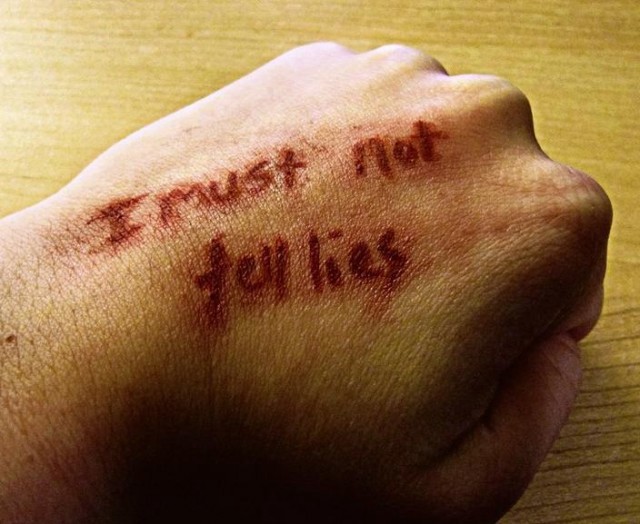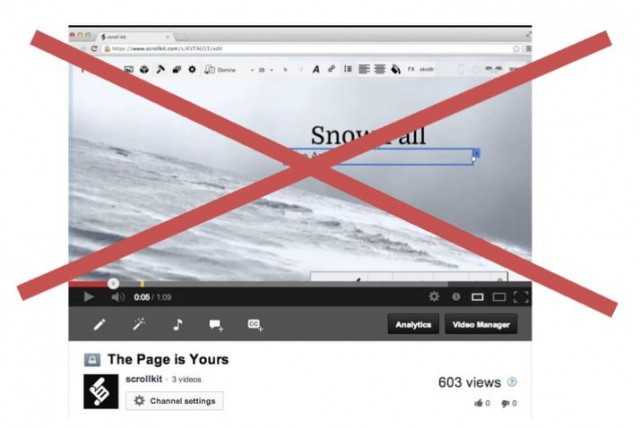Ask Polly: I Desperately Need Everyone To Like Me!

Appearing here Wednesdays, Turning The Screw provides existential crisis counseling for the faint of heart. “Because it’s all been a pack of lies.” (Cue drum solo.)
Dear Polly,
This is probably far from an original advice-seeking topic, but I need an original answer. I am a 28-year-old woman who still feels the need to have everyone like me. I mean everyone. People I like, sure, and people whose respect I would like to have, but also people I actively dislike, people I will surely never see again, people I will never see even once in real life. Work people, Internet people, flying purple people, you get the idea. Errybody. I fully understand the insanity and inanity of this, but it seems to be a problem I can’t figure my way out of, and the majority of advice I’ve read/heard amounts to, “Stop caring. Just don’t care anymore!” But of course it’s not that simple. Reminding myself that I don’t even like him anyway or that I’ll never have to see her face again does nothing to alleviate my striving for their approval, and it definitely doesn’t dull the pain if I don’t get that approval. Same goes for other strategies like reminding myself about all the wonderful people that have my back no matter what or adopting a fake-it-til-you-make-it, balls-out, “fuck tha haterz!” attitude.
(For background, I have an idea of where some of this comes from. I was friend-dumped a lot as a kid — particularly by a group of girls who would routinely and arbitrarily decide we weren’t friends anymore and ignore me for a few weeks until they graciously forgave me for the nothing that I had done to them. Being a sensitive child, I turned this inward and decided it had definitely been something I did or said that made them temporarily terrorize me, and I felt so grateful and determined to not fuck it up again when they would allow me back into their mean girl clubhouse. But I feel that this only accounts for some of the problem.)
Of course, in the process of trying to be universally liked, I end up losing a lot of myself, agreeing with arguments I don’t actually agree with just to be agreeable, putting forth opinions that I in no way hold but sense the other person might approve of, holding my tongue when I should speak up, etc. This feels predictably horrible and gross afterwards, but the sad truth is it doesn’t feel as bad to me as being rejected or even just plain un-liked, which I experience as disproportionately unbearable.
I can spend days agonizing over whether or not I offended a stranger I spoke with at a party last weekend with my joke that they misconstrued, hours feeling wretched about a mild Twitter insult from an ideological adversary whose real name I don’t even know. I can believe in my good intentions or the righteousness of my argument 100%, but my conviction doesn’t seem to blunt the pain of any and all backlash that comes my way. Experimentally, I’ve tried small acts of attempted skin-thickening, entering into situations where I know I’m in for rejection/dislike (saying absolutely anything in a comments section, for example), and even in full emotional crouch, armor on in anticipation, negative responses still hit me with gut-punch force.
This is as untenable as it is ridiculous. I need to develop a skin that is thicker than crepe paper and be able to let go of the many, many people I will encounter in my life for whom I am just not a great flavor. I need to stop trying to control everyone’s perception of me. I need to let them see the real me AND make peace with the fact that they might not like what they see. (I am assuming people can actually do this, in real life? It just seems so impossible from where I am now.) I dream of one day being able to laugh off and immediately forget the criticisms and insults of casual haters, to disagree with an acquaintance without fear of alienating them completely, to call out an asshole on their objectively asshole-y behavior without feeling nauseated and regretful afterwards. I can see this Cool Future Me, a confident and uninhibited woman who is occasionally controversial or too loud or kind of haughty or wrong-headed but is okay with that because that’s who she is, dammit. She is calm and brave, and I want to be her so, so badly.
I know this totally unflappable version of myself is an impossible fiction, but I need to at least move in that direction, away from the cowering people-pleaser I currently am. The question is, how on earth do I do that? I predict therapy will play a big role in this when I can one day (soon, hopefully) afford it, but for now, is there anything I can do on my own to address this issue?
Sincerely,
Approval-Seeking Missile
Dear Approval-Seeking Missile,
Everyone seeks approval in one way or another. But people like you who seek approval compulsively, from everyone, tend to have some emotional trigger around approval. Maybe a parent repeatedly disapproved of you, or led you to believe that their very vocal approval was conditional, based on their somewhat eclectic expectations of your behavior. So now you alternately avoid approval-related situations and seek them out, seemingly to excise these demons. But it never really works out that way, does it? You get confrontational, hoping to stare down the worst and maybe to explain yourself, but it just makes you feel physically sick, right?
Emotional triggers are bizarre things. They’re these weird areas of wild weeds and unpaved roads in our psyches. Even if every other part of us is all sparkling skyscrapers and bullet trains and really good restaurants, if we stumble into this wilderness area by accident, we end up feeling totally confused and ashamed. There may be happiness and satisfaction — or at least control — everywhere else in your life, but those scrappy hinterlands always seem to have jihadis hiding out in caves, ready to take down the teeming metropolis at a moment’s notice.
And maybe you suspect that other people are too different from you to ever approve of your real self. Maybe you don’t like that many people, so you feel that you have to bullshit them just to keep the peace. People say random shit and you agree with it, whatever the fuck it is, because you don’t even know how to begin to say, “Well, that makes no sense to me. In fact, nothing about you makes sense to me.” or just “I’ve always thought exactly the opposite, honestly.” Your deep disapproval of yourself leads you to disapprove of other people, so you have to live a lie and act like you approve of everyone just to prevent starting an all-out war every few seconds.
Now, as unappealing as it can be to plod along with the herd, nodding and agreeing and resisting the temptation to make waves, the fact remains that these behaviors are essential to adulthood. I resisted these things for so long, but a lot of my resistance was strictly immature and ego-driven. Calmly observing other people, seeking to understand them without asserting your ego constantly, listening before you speak: these are important habits to develop in yourself, habits that will make people like you for a good reason: You have self control, restraint, and a genuine interest in the world around you. You are demonstrating that you’re not so self-involved that all you give a shit about is you, you, you.
But aping people, repeating their ideas back to them, agreeing enthusiastically with shit you don’t agree with? This is not adaptive or healthy behavior. Approval that’s gained by aggressively faking it isn’t really approval. It’s bullshit. The people who you’re tricking into liking you don’t mean anything; they might as well be cursing the day you were born, for all they know about your true self.
So let’s try to imagine all of the people who were basically born to dislike you, no matter what you do. Among these haters, let’s include the ultra-conventional thinkers and the frightened idiots and the raging douchebags and the slow-moving animals who are allergic to ideas, then throw in the women who hate women and the men who hate women. George W. Bush might also include “the enemies of freedom” on his hater list. Others might include the enemies of red hair, the enemies of assertive Greek men, the enemies of marriage equality, the enemies of good taste, etc.
And let’s not forget the people who are envious of some aspect of who you are. Remember, people can be envious of flaws, too. You stick your foot in your mouth, they would never do that but sometimes wish they took more conversational risks, so you suck. Like that. You dare to express your feelings, they see that as the path to ruin, but they’re sick from choking back their feelings all the fucking time. And so on.
Now we’re looking at lots and lots of people who will never like you no matter what you do. Even if you agree with them vociferously, they won’t like you, no fucking way. And look at who we’re talking about: There are so many of them! Some of them are really wonderful people, I’m sure. They’re aren’t nearly the tools you assume them to be, trust me. They have great big hearts, they have feelings, they have joys and sorrows. But they have one thing in common: They find you deeply repellent. Are you seriously going to scamper around for the rest of your life, catering to THESE people?
But the individuals involved aren’t the issue, are they? It’s the feeling that disapproval kicks up in you, whether it’s disapproval from your best friend or disapproval from the guy at the corner store who hates you for wearing boots and playing the lottery. And when people seem well-equipped to like you, but they don’t anyway, that’s the absolute worst. You figure they just don’t understand you. You’re thinking, “If they got to know me, they would see what a great person I am!”
This is where you fail. You truly believe that you have control over other people’s narratives about you. You think that, if you had a little time with these people, you could explain yourself to them. “But I’m really a nice person!” “I have such good intentions!” “I didn’t mean to sound surly like that, I was just in a bad mood!”
You need to let go of control. What you’re suffering from, in part, is a compulsion to “fix” shit that cannot be fixed. You’re reaching for something that is totally beyond your grasp. You might as well wish the moon out of the sky, for how much control you have over other people’s ideas and impressions of you.
Lots of people dislike me. A lot of times, they dislike me for exactly who I am. I am friendly but moody. I clean up well, but not very often. I don’t always bite my tongue, or behave in ways that other people find pleasant and enjoyable, but that I find tedious and soul-crushing. Even though I have learned to listen, to enjoy how different people are from each other, to keep an open mind, to stay calm and shut up, I’m still not everyone’s favorite. Sometimes I just want to say something obnoxious, because no one else seems willing to do it, and there’s a great big gaping hole where the obnoxiousness should go (even if I’m the only one who sees it).
So first of all, I want to say: Get used to it. That doesn’t mean go out and make noise and see what happens. The less I act out of a compulsion to assert my ego in the world, the more I like other people and enjoy my life. Don’t drop conversational bombs. Don’t poke people. Don’t stir up shit for no reason. Don’t drink way too much and then do these things. That’s not the path to good emotional health OR good personality health, which is sort of what we’re talking about here. It’s a way to injure yourself, pure and simple.
But you don’t have to loudly agree either. You have other options. You can say nothing. You can stay quiet even when other people are saying, “WELL?!!” You can choose not to weigh in. You can ask questions instead.
Stay calm. Try to tune in a lot when someone is talking — go where they go, be with them. But try to ignore what they might think of you. Experiment with hinting, vaguely, that you don’t agree, but don’t argue your point after that. I know this sounds like me instructing you on how to be an inscrutable, annoying motherfucker, but what I’m really trying to show you is that just because you’re a youngish woman doesn’t mean that every fucking jackass in the world has a right to know exactly where you stand on everything. Do men explain exactly what they mean about everything? Almost never. They are often comfortable simply flashing a look that says “I prefer not to explain myself.” Learn how to serve up that look. Learn how to be a person in the world who is not fully known and understood.
Because some part of the world isn’t going to understand you no matter what you do. Sometimes I think that I became a writer out of this totally misguided compulsion to be understood by EVERYFUCKINGBODY. I just write and write and write, due to this core dysfunction. That’s pretty shameful, right? But it makes me who I am. It fuels what I do, and I really love what I do. So I have to love my compulsive confessional explainy self, too.
Sometimes our worst emotional triggers fuel our greatest talents. Maybe there’s some part of you that’s absolutely beyond compare, thanks to this compulsion you have. Forget the calm, brave woman you imagine becoming for a second, and embrace the jittery approval-seeker. It’s ok not to be a fucking superhero. Stay with who you are right now, and don’t hate that person for her weaknesses. I know this is a big challenge for you, but try to breathe deeply and monitor those times when you start to feel physically ill over someone’s disapproval. Try to stay still in the face of these moments, and accept that this is a part of you. Resist the urge to do something, to take action. Observe how dramatic your emotional reaction is, and accept it, but don’t start nodding and agreeing to release the tension. Just exist. If you start to cry, or laugh, or shake, let that happen, and dare not to explain it. OR dare to explain it to someone you trust. At the very center of this “problem,” there’s you, judging yourself badly for having this trigger. But trust me, every single person you know has something that sets them off and makes them feel weak and freakish and bad. The only difference is the way you explain it to yourself, and the action you keep taking to paint over this very interesting and challenging part of who you are. It’s time to accept this part of you, and stay with the fear of disapproval, and give it some air to breathe, so that it won’t rule your life.
Everybody’s messed up in one way or another. Some will love you, some will hate you, but most don’t give a fuck either way. The only reason these “disapprovers” pay any attention to you at all is because you’re waging a war, internally or externally, to win their approval. Learn to accept this approval-seeking impulse of yours, but try to stay quiet and observe it instead of acting, and most of your (imagined) detractors will lose interest quickly. Then they’ll wander off in search of something else that might distract them from their own emotional jihadis.
Polly

Dear Polly,
I lie all the time. I always have. Even when I was a kid who never did his homework, I could never own up to the fact that I hadn’t done it. I’d look at my shoes and mumble some chickenshit excuse for not having something that never existed. I have gotten through elementary, middle and high school and most of college this way. I have lied about being in intensive therapy in order to excuse weeks-long absences where I just didn’t feel up to attending class or telling my professors what was going on. I spent several months lying to my parents about being enrolled at school while I was really just faffing about in an apartment while they paid my rent (this was following the semester where I had a fairly comprehensive breakdown where I stopped answering any phone calls and stopped going to class and started sleeping while the sun was out). I feel fine taking things from friends and family and supermarkets without any remorse. I am 23 and have never had a girlfriend, both not for lack of trying and for lack of trying. I feel like a sociopath sometimes, but I don’t think that’s true. I care about the people around me that I care about. Do I just care about myself more? Am I destined to be a drain on those around me? And, most importantly, what the fuck?
Best,
Lying in Lyon
Dear LiL,
Call your parents and tell them you have a lying problem. Tell them you need to go to therapy. (Again? Come clean? I don’t care which, just tell them you need it.) Tell your therapist that you have a lying problem, and you need help. Commit to never lying to your therapist about anything.
You have no destiny. You simply have a choice: Do you want to continue to live this way, or not? I don’t think you care about yourself enough, honestly. You hate yourself for lying, but you continue to do it because you figure you’re just that kind of a sucky, lying type of person. You feel you have to lie to cover up just how much you suck, in fact.
I can’t tell you how to stop lying, beyond saying that you’re fucking yourself over and you’ll never have real relationships and real happiness until you stop. All I can tell you is that you have to take the first step: Go to therapy and commit to telling the truth there.
Good luck.
Polly
Is your personality a pack of well-crafted lies? Write to Polly and find out!
Heather Havrilesky (aka Polly Esther) is The Awl’s existential advice columnist. She’s also a regular contributor to The New York Times Magazine, and is the author of the memoir Disaster Preparedness (Riverhead 2011). She blogs here about scratchy pants, personality disorders, and aged cheeses.
Shy cat photo by Tambako the Jaguar; lying hand photo by Marisa Watts.
Everyone Secretly Hates "Snow Fall"

Cody Brown, of Scrollkit, made a replica of the ballyhooed New York Times “Snow Fall” story — in about an hour. Naturally, the Times made a copyright complaint: he was, after all, using their images and whatnot! So he removed it. Then they insisted that he “remove any reference to the New York Times” from his website. Heh.
He writes:
The backlash to “Snow Fall” is that it’s an indulgence only the Times can afford. It took them six months and a powerful multi-person dev team to hand-code it. Most news orgs don’t have anywhere near these kinds of resources, and this is why we’ve spent the past year creating a tool that opens the ability to produce these stories to significantly more people.
This is a good point, even though we should note that it’s in service of promoting his company, and it’s not something many people want to say in public. (Update: We want to be clear that, yeah, there was not actually SIX MONTHS of coding. That’s way over the top.) Privately, the kvetching about Snow Fall among “media people” has been pretty intense. Each time this topic comes up around journalism profs or reporters, there’s a huge amount of eye-rolling. That eye-rolling is always, however, as it should be, preceded by praise: it was great work, it needed to be done, all that jazz. Everyone appreciates the labor; they just don’t think it changes everything. There’s generally five ideas people bring up.
Their points generally are:
• Although it was an exceedingly well-reported story that lent itself well to lovely web expression, the story itself was not particularly newsworthy, or recent, or ground-breaking, or exclusive.
• During the story’s construction, it became a situation where it seemed — at least from the outside — like the form began to demand unreasonable length of the content.
• It was a monetary sinkhole: while the coding seems spectacular (and it didn’t destroy browsers, unlike recent efforts by Pitchfork), the sheer person-hours devoted to it were financially untenable.
• The obvious lack of involvement of the sales team at the paper was incredibly short-sighted.
• With an average of 12 minutes on site for its visitors (which is to be fair very, very long!), there’s still no way most visitors actually read that story. They came for spectacle.
The off-record beefing about Snow Fall in many ways isn’t even Snow Fall’s fault! It’s the hubbub that surrounded it after — all the Snow Fall will save media baloney. We all like Snow Fall, we’re just tired of having to hear about it at conference after conference and panel after panel. Besides: not made like that it won’t “save journalism.” No way.
It’s a shame that the Snow Fall model eclipsed the Nate Silver model in the imagination of the “future of journalism” crowd. In early 2012, 1% of Times readers were reading Nate Silver; as the election drew near, on a single day, 20% of Times readers came to read Nate. Using traffic from September of 2012, the Times was doing about 8 to 9 million people a day overall, in Comscore numbers (so: vastly undercounted probably, and as the election drew near, traffic surely increased).
So Nate Silver basically did Snow Fall-level traffic in just a single day. As cyclical as politics traffic obviously is, that’s still a much better future of journalism — and a much better use of budget.
Record Shopping With Carrie Brownstein
by Awl Sponsors
You know her as a sketch comedy master on TV. Watch Carrie Brownstein portray one of the many faces of membership from American Express, this time as a vinyl-obsessed shopper. Even as an avid consumer (literally) of records, her character is able to stay within budget thanks to the American Express Prepaid Card, a prepaid card that ensures she won’t rack up any overdraft fees.
Learn more about how the American Express Prepaid Card can help you manage your budget.
Is Your Addiction To Sour Clumpy Milk Killing The Environment?
“Greek yogurt is a booming $2 billion a year industry — and it’s producing millions of pounds of waste that industry insiders are scrambling to figure out what to do with.”
Bear Frightens Horses, Roams L.A.
If you started off your day in a state of depression because of that bear-milking story, hang on:”A bear is wandering through a residential area Wednesday morning in Sun Valley. The bear has been climbing fences and roaming through residences’ back yards. The bear surprised two horses as it emerged from one backyard, then walked through another corral with three horses a few blocks away.” I am not sure yet how this whole thing will play out, but it has got to end better than “caged bear getting liver drained for medicine.” I mean, right? This week has been pretty rough already, I don’t know if I can take anything more.
Terrible Region Between Herald and Time Squares Shut Down Due To Alleged Jumper
Gotta jumper next door. Police putting up air bag in case he leaps! Don’t do it! twitter.com/bbyrdi/status/…
— Brian Byrd (@bbyrdi) May 22, 2013
Midtown South has a jumper problem. This morning New York commuters found themselves tangled up with an apparent suicide watch, and they reacted in the way New Yorkers do.
Guy a block away from work is a “jumper” or some shit. Shitloads of cops and ambulettes swarming, got inflated thing up.
— S.B. (@ItsNotStephen) May 22, 2013
So, there’s a #jumper on the bldg next 2 us. It’s almost more disturbing that ppl R watching, taking pictures of the guy & his bouncy castle
— joyabella (@joyabella) May 22, 2013
Hostage/jumper situation on 38th & 6th, two blocks from the office. There’s always something going on in this city
— Vinny Giella (@VinChenz00) May 22, 2013
Nothing like coming in to work to your coworkers talking about the jumper on 38th St to put your whole day into perspective.
— Anakela (@Anakela21) May 22, 2013
There’s a jumper on a building on 38th St. Huge police commotion, giant inflatable ready to catch him. Tourists idly snapping photos.
— Dan Stewart (@thatdanstewart) May 22, 2013
Police putting inflatables in the street at 38th and 6th to stop jumper
— Joel Braunold (@braunold) May 22, 2013
Potential Jumper @ 38th & Broadway…. & you got up this morning, got dress, came to NY to jump??? Why not just stay in bed. Smdh
— Diva Daughter (@PrincessMiMi4U) May 22, 2013
“He’s just teasing us” says the 20something. “If he were gonna jump, he’d have done it.” #jumper
— joyabella (@joyabella) May 22, 2013
Transit Plans Of The Once And Future Mayors
“When I become mayor, you know what I’m going to spend my first year doing? I’m going to have a bunch of ribbon-cuttings tearing out your [expletive] bike lanes.”
— Anthony Weiner to Mike Bloomberg, June 2, 2010
“Come January 1st, when I am out of office, I am going to destroy your f — king industry.”
— Mike Bloomberg to Taxi Club Management CEO Gene Freidman, May 16, 2013
“Go fuck yourself.”
— Christine Quinn, lots of times probably
The Decrepit Beauty of Dallas

On a recent walk through downtown Dallas, I stopped to admire an old light fixture attached to an abandoned building. The streets around me, lined with weedy lots and architectural wreckage, were deserted enough to feel vaguely menacing. A car cruised past; its driver and I seemed to regard each other with the same wary suspicion. I returned my attention to the light. “Look at me,” it whispered, defiant and exhausted, “and try to tell me that the old world was not better than the new one.”

I wasn’t so sure, given that whatever good you want to say about the past, the fact remains that it led us to the unfolding misery that is the present. Still, I could appreciate where the light fixture was coming from; its wrought-iron craft resonated with the lost beauty of old things, and it seemed to cling to its arts-and-crafts heritage with a blind tenacity and optimism I found courageous, when so much else in the neighborhood — except for the nearby skyscrapers, which hovered like ambivalent, impenetrable fortresses — had succumbed to the violence of time and neglect.

As I continued walking, I considered whether the decrepit state of the area was more a function of geography than chronology. Had the light been born in New York City, I speculated, it would have long ago been ferreted away by an architectural salvage operation to be resold, or perhaps it would have remained with the building as it was transformed into pre-war “luxury” condominiums or commercial office space that now command a premium in Manhattan. Its life, in other words, could be relatively eternal, like something in a museum, or an image on the internet.

Yet as I considered New York City — or at least the gentrified parts — it was hard to drum up much enthusiasm. True, we don’t have highways crisscrossing the center of the city, but over the past twenty years, we’ve built a swath of opulence — homogeneous, casual, and self-referential — that makes it easy to forget that close to half of the city’s population live in or near poverty. In some ways, the city has replicated the online world, where distancing yourself from social ills is generally about as difficult as a click of a mouse. The urban blight in which I stood may not have been attractive, but it at least it was honest: here, you could not pretend that all is well, that there isn’t an unbridgeable gulf between the haves and the have-nots in our country.

Some gays have an almost instinctive ability to find the marginal areas in cities — the alleys, dirty bathrooms, and wooded copses — frequented by others looking for anonymous sex. My talent is related but different: I have radar that directs me to the hardscrabble nurseries filled with struggling plants and decomposing statuary. I am a lover of sad trees.

I felt comfortable here; none of us, it seemed, were interested in working for soulful fulfillment, we just did our jobs to pay for our existence. It was a thought that led me to reconsider the surrounding area with new eyes, and it finally occurred to me that the most apt correlation I could make was not related to gentrification (or its lack) but the psychology of middle age and its inevitable discontent. This forlorn, crumbling neighborhood was a reflection of the way life falls apart; its scattered, fragmented beauty represented the rare moments of revelation with which we — if we look hard enough — are sometimes graced.

When I find myself in downtown Manhattan or Brooklyn, by contrast, I feel like I’m suffocating in a miasma of gleaming perfection and failed potential, as though I were being forced to inhabit the pages of a magazine spread. Far better, it seemed, to remain an outcast, someone who lives in ignorance of the financial and cultural elite.

The identification of the problem, however, did not lead to an easy solution; for one thing, I wasn’t really an outcast, and it was disingenuous to pretend otherwise. For another, I was tethered to New York City; maybe I could have left twenty years ago, but I had stayed, close enough to observe the machinations of the city and its rulers, but not close enough to partake.

Trapped by age and circumstance, at least I wasn’t alone; here, all of the statues seemed to hold a similar ambivalence for modern life. A bird shook out its wings but remained affixed to the ground. “We would fly away if we could,” it told me, “but we have pots on our heads.”
Matthew Gallaway is the author of The Metropolis Case.
New York City, May 20, 2013

★★★ The morning fog was thick and forbidding, but the pavement was merely damp. The mistrustful kindergartener, preparing to go out the door, could be shown that people were down there without umbrellas. Soon enough, the worst had burned away, leaving only a lingering mist on the river and haze in the streets. By late morning, there were only a few scaly patches of cloud in a blue downtown sky. Motorcycles and bicycles came out; greenery twined in a bike’s basket. Below Houston, shorts were out: baggy tourist shorts, short-shorts, culottes, everyone’s own idea of ventilation or liberation. Uptown, in the evening rush, people seemed to be mostly still wearing the pants in which they’d gone off to work.
